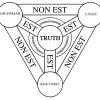Search the Community
Showing results for tags 'Logic'.
-
So, I don't know if anyone has already done this or not, but I thought it would be very useful to organize the UPB framework into a concise series of criteria tests much like is done with the scientific method. This has helped me use UPB to either validate or invalidate a moral claim. Please look it over and let me know if I have forgotten anything: Criteria for a UPB proposition to be valid: 1. Cannot be proactively positive. 2. Must be universal across space, time, and conditional scenarios. 3. Must not simply be a description, but must be a valid negative obligation that one can put into practice. 4. Must pass the common sense test (the rape test et al). 5. Must negate the morality of a positive action that one is reasonably able to avoid doing. 6. The morally negated action must create a negative outcome for another party simply by the act of committing it. [Side note: We could objectively prove this as a necessary criterion by saying that the morally negated action must create karmic debt for the actor] 7. The morally negated action must not be reasonably avoidable by the victim of the action otherwise it is an aesthetically preferable behavior. 8. Positive net benefits of compliance to the moral rule must be verified empirically once put into practice.
-
Hi there. I joined the board a while ago, but haven't really posted anything serious until now. I have spent the last 10 years discussing politics with all people holding all kinds of viewpoints, from objectivists to libertarians to liberals to conservatives and others. As someone who is building a company to empower people and unite communities, I believe that technology lets us decentralize power structures and help people do things better. I've been fortunate enough to meet and correspond with many political thinkers thinkers, such as Noam Chomsky, etc. I would say that my political leanings, at the end of the day, wind up somewhere between Social Democrat and Techno-Liberal. Preamble: Although I admire Stefan Molyneux's convictions, I think he is too ideological and incorrect on many issues. Many times he invites people to provide "real arguments" to challenge his viewpoints, so it's frustrating that I have never been able to get ahold of him. Probably his show is so popular that he gets tons of mail a day. I would be very happy to discuss issues of anarcho-capitalism with him on his show or in person, but since I'm on this board, I may as well bring them up here, so as to get a real discussion going. To say at the outset: I believe that Capitalism enjoys the status of a quasi-religion in the United States. Every time it's mentioned, someone has to add how amazing it is, and every time someone points out a flaw, proponents are very quick to point out the problem is *never* with actual Capitalism, because Capitalism is just (presumably) the natural state of man, voluntarism in its essence, and the problem must be somewhere else (hint: Government, which exists everywhere and at all times). I realize that presenting problems with Capitalism here is a bit like presenting problems with Mohammad in Saudi Arabia, but nevertheless, I know there are plenty of people who are open to reason and logical discussion. I feel a bit like Sam Harris challenging SJWs: https://www.samharris.org/blog/item/the-end-of-liberalism so at the outset I need to give my bona fides: I think Capitalism is an amazing system for many things. Free trade, low barriers to entry for enterprises, and bankruptcy protections (the latter is not anarcho-capitalist) have led to a lot of innovation. However, there are many externalities as well. One may say the free market is A and B deciding C is for dinner. Most problems come down to this. Anarcho Capitalism: While Capitalism is great, I don't think it's perfect, nor do I think it's the inevitable and only system which can develop under voluntarism. There are anarcho-socialism and many other possible systems people can voluntarily enact. But they, and anarcho-capitalism, are just ideologies, they are not achievable in practice. Here is my first problem with anarcho-capitalism: it is incoherent. Suppose we take a principled, deontological approach to it. We insist that our entire society must be built upon the Non Aggression Principle. Anything that violates the principle is out. Well then, what is private property? I think it's fair to define it as a monopoly right to exclude others from the use of some resource. And how are you going to exclude them? By force. So that's what it means when people "enforce" private property. Preferably by some private security or paramilitary group, cause government violates NAP. But wait, men with guns? Aren't they initiating force? "No," says the anarcho-capitalist. They are not, because they are using "defensive force". But what is "defensive force"? "Well, one example is defending property." Ah, so we're kind of begging the question here. We're carving out a specific exception for "property", whatever that is. Well, some anarcho-capitalists believe in Intellectual Property. I can go ahead and use "defensive force" to go and attack a peaceful person who I never met and never had any problem with, because they built a contraption that infringes on my "intellectual property". They "stole my idea". So, we can own ideas? Other an-caps say no, you can't own ideas. But now we are stuck. Some people believe you own the idea and I infringed on it. Some believe I didn't. Now you use force, and we're stuck: did you initiative force, or not? Maybe you believe in copyright but not patents. And I share a movie that I bought that you spent $50 million making. And now no one buys your movie anymore. So you attack me. Because your business model is built on the idea that people can "own" bits inside other people's computers. It creates artificial scarcity, and extracts rents. What is Property? OK, you may say, intellectual property is just an exception, like age of consent. No system is perfect, and in those cases we just have to resort to whatever the majority of people think in the area. Well, that's exactly what happens with laws and jurisdictions. Let's suppose (as Stefan probably does) that you can't own ideas. So, can an individual own large bodies of water, like Lake Superior? Can they own a huge forest? Suppose I don't recognize your right to (read: use force to exclude people from) large swaths of land. I'm in good company: many Native American tribes did not believe in such extreme land ownership. Even John Locks, whose idea of "homesteading" many libertarians use, explicit said about homesteading that a person should not be able to legitimately own far more land than can feed him and his family. I have never heard anarcho-capitalists admit that this was John Locke's actual position about "homesteading". And suppose John Locke was wrong, and you set out to prove to me that, no, in fact one should be able to own everything they "homestead". So Johnny Appleseed can plant a tree every 50 square feet and he can come to own plots of land the size of Kentucky? Even if he abandons each spot for 50 years? What about adverse possession, easements, and all those other aspects of actual property law, don't they get in the way of the simple idea of "homesteading"? Consequentialism And suppose you wanted to prove to me that one should be able to own property of any kind and exclude people from its use, by force if necessary, and this doesn't violate the NAP. How will you go do that? Typically you will use consequentialist arguments! "Look, if we don't pay content creators for their work, who will make content?" "Look, Capitalism leads to greater prosperity than Socialism". These are questions that deal with facts about the world, and we can explore them, and you may even be right. But that admits that consequences matter and not just arbitrary principles. Milton Friedman was one of the few consequentialist libertarians and his arguments are far different from then NAP. They are arguments like "no one spends another's money as well as he spends his own". I am far more receptive to consequentialist arguments, but that also opens the door to the possibility that Social Democracy, Open Source Software, Science, etc. may be better at achieving some outcomes than Capitalist systems. Force So, the NAP definitely can apply if we define "initiation of force or threat of force" to be against a person's body. That is well defined. How about against a person's mind or psychological well being? Maybe. But once you start arguing that "the 1000 acre forest" is an extension of you, or an entire lake, and peeing in "MY LAKE" is the same as having sex with "MY BODY" and therefore the private cops arresting you are not "initiating force", you lose a lot of people. It's a stretch to believe that private property has no limits. Maybe chattel, like owning a pencil, or food that you're going to eat. But owning 1 million apples that you're not going to eat? Probably not everyone will agree. So what if they don't agree, and eat those apples or squat in "your" 1000 acre wood and refuse to leave? How will you get them out without using force? The whole system of property falls apart if you can't enforce it. At some point, the NAP requires people to recognize your unlimited right to property. And they may not do that. And also, the NAP says nothing about what force is proportional. Suppose I find myself on your land, or I pee in "your" bushes, in your back yard. You call the cops, and they ask me to leave. I say I don't want to. Can they now put me in a cage where I will be raped? Why not skip all that and you just come and keep the intruder as a sex slave for 30 years? I mean, what kind of a system is it where you base everything on one principle, and insist all other legal principles are illegitimate? And if other legal principles are legitimate, then you're right back to jurisdictions and laws. Some people believe some things, and in other areas, other people believe other things. Depending on where you live, people may have different laws, different ages of consent, different ideas about property. So my point is ... basing your entire worldview on the NAP is incoherent, unless you don't believe in property. But anarcho-capitalism is all about property. Bottom line ... how are you going to get that anarcho-socialist voluntarist intruder out of your forest if you don't believe in initiating force? How are you going to get him from not re-selling that movie you worked so hard on? All this is just the first (and most direct) issue I have with anarcho-capitalism.
-
I was typing up a reply. Here is an excerpt. Does this make logical sense? I am saying that X can be objectively measure, but whether or not it is of any value is subjective, and therefore X is subjective. Is X subjective? Like I might not value the theory of relativity (because I am entirely ignorant of it) yet I'm sure (?) it can be measured. If it can be measured and clearly defined, it's objective, right? It's the value part only that's subjective, right?
-
Logic begins when it is discovered that A is A, however, how does one discern what is discoverable without first knowing that A is A? Empiricism is a precept to our nature. After all, we are born as little scientists. Empiricism is a given. One cannot argue against it or for it without presupposing it. But if empiricism requires an understanding of logic, then is logic also a precept? (By precepts I mean involuntary knowledge about the world that is not conceptual, no different to how animals know things. It is regulated by our neurobiology.) If logic is a precept, then is it the case that logic is not a concept. But if logic is not a concept, then does logic exist in reality after all? Embedded in the neurons of our brain, so to speak?
- 7 replies
-
- logic
- empiricism
- (and 11 more)
-
On December 27th, 2016, Stefan reloaded a YouTube video that he uploaded several weeks prior, titled "Woman rejects feminism, triggers SJWs". There is something Stefan is missing in his argument, he says that late teens/early 20s is the best time to have children for health and fertility reasons, and encourages women to go with child-rearing first, career later, but at this point in a person's life, most people have very little money and can barely afford to live on their own. Picture it: Young couple, the woman stays at home to be a young mother, WHERE is the money coming from? The father's crummy job changing tires or stocking overnight at Walmart? You can't raise a family in 2016 with an income like that. More money has to come from somewhere. Living in Toronto, being older and well-to-do with his successful wife, Stef's position isn't in touch with the current economic situation for the age group he is encouraging to have children. Am I wrong? Did I misunderstand his statement?
-
I am asking this because recently i had an apphipheny (spelling?) about my anger and reason why i have been so struggling with motivation, is because as kid and always i did good rational things for other sake. IN THE PAST, (especially childhood and teens): Why be good? Because others. Why be good? Rules. Why be rational? Because unhappiness otherwise and because its hurts OTHERS. So i find myself in almost ego-death'esque situation with my own beliefs about myself. Why should i do or be anything or anyone? Why simply not lie, be crazy, insane, and contradictionary? WHY does it really matter what i want? What’s the difference between my preferences and anyone else? Why shouldn’t i just take other peoples desire as my own? Yes, this is also about setting or not setting Rules for yourself. And also about the value of myself value if any of my preferences? Why should i prefer anything at all? And is this question itself contradiction on some level? Do i "prefer" truth over falsehood? I do or maybe i say i don’t. Maybe i say gibberish. Then what? Does it all come down to preference? And if so... why do i feel like that’s an arbitrary/subjective standard and thus meaningless or exactly the same as anyone else’s opinion or preference? I feel like my preferences do not have any value objectively. I prefer health? I prefer truth? I prefer to be moral and kind and good? Who cares about that? PS. Yeah... one could say that i sound and come off as bit of nihilistic... but that’s empty one feels when finally your shrugs off your FALSE reason to be X Y or Z. When false-self goes, when "respect" for parents complete evaporates. When values placed and forced in me by abusers vanish.
-
If there is one thing that I never "came to terms with" in regards to Stefan's views on the major areas of philosophy is his take on epistemology. I could not identify from the very beginning what exactly was bothering me when he would argue epistemological problems but after a while, I think I identified the source of my distress, that is the synthetic-analytic distinction. I do not actually remember him ever specifically addressing this issue but by deduction from his viewpoints on epistemology, in general, it seems to me that he rejects the synthetic-analytic distinction (I have also read that Ayn Rand rejected this distinction too and since Stefan said that his views on epistemology mostly come from her, I would not be surprised if he does indeed reject this as well). The synthetic-analytic distinction basically puts propositions in 2 categories: -analytic propositions: those propositions "which are true by virtue of their meaning" Ex. There are no married bachelors. -synthetic propositions: those propositions which "are true by how their meaning relates to the world" Ex. Gases expand when heated. What I am arguing is that there is a fundamental difference of certainty we can have in relation to those 2 categories. The difference is that we can prove (100% certainty) whether an analytic statement is true or false, in other words, we have knowledge regarding those but we cannot prove whether a synthetic proposition is true or false since we must rely on external observation and experimentation and not on the laws of logic. How could we prove for example that we are not a brain in a vat? However, my impression is that Stefan does not believe in this distinction (is my impression wrong?) for him "gases expand when heated" and "there are no square circles" are equally "provable". How come? Did he ever give any arguments for this? Ultimately, what is your take on this subject?
- 46 replies
-
- 1
-

-
- knowledge
- epistemology
-
(and 1 more)
Tagged with:
-
A response to a criticism I see all over the internet.
-
Originally Published on Medium. https://medium.com/@joelpatterson_52315/whataboutery-don-t-do-it-df00f8667578#.anospiwty There’s a tactic I’ve noticed my opponents use in disagreements I’ve had recently that I find really irritating. It goes like this: You bring up a criticism of something, like say Islamic terrorism, and instead of having your criticism evaluated, accepted, or rebutted, someone completely bypasses everything that you had just said with a, “what about” statement. Here are a few simplified examples. Islamic terrorism has resulted in x numbers of civilian deaths this year. “Yes, but what about American foreign policy!?!” The contains anti male themes and here are the instances from that film which support that thesis.“Yes, but what about when this character did this in the prequels?!?” People on the left use this manipulative argument quite often. “Yes, but what about the right. People on the right use manipulative arguments too?!” Studies show that females abuse in this way at this specific rate each year. “Yes, but what about the MEN?!?!” Little do people know that cats bite humans at a rate of x per year. “Yes, but what about Dogs?!?” I’ve been trying to articulate my frustrations about these kinds of responses for a few months now, so it was to my great delight that Richard Dawkins did just that while I was listening to his autobiography , “Brief Candle in The Dark.” Hopefully, by giving others the language to identify this response, it will save people from the frustration and confusion I’ve been experiencing from it for some time now.
- 17 replies
-
- 6
-

-

-
I, like I presume many people here, enjoy engaging in discourse in various communities around the net. I like to challenge myself in the pursuit of reason, knowledge, and evidence by trying to pit my wits against discourse. But often times I feel like maybe I'm missing something when it comes to being as precise as I desire. I know I'm not terrible by any means, but I often feel a little lacking in feedback. Like there's no experienced individual I could turn to for judging my discussions. It'd also be nice to have a second opinion for telling me when enough is enough. I don't want an echo chamber, just to meet people who can tell me when I've done an apt duty at defending reason, rationality, and evidence. I suppose I moreso worry that I'm picking fights which are too into the realm of being unreasonable and I'm not doing anything but wasting my time and making a foolish display for those who would like to do similar. Does anyone else feel similar?
- 1 reply
-
- help
- Argumentation
-
(and 1 more)
Tagged with:
-
I recorded a response to Stefan's arguments against Nonviolent Communication, in hopes that many of you who were mislead by him would reconsider both its validity and usefulness. Take a listen and if you have any questions, please don't hesitate to ask in the comments below. Also, if you want to criticize the substance of my response, I would love to hear that as well. Please don't criticize my speech or delivery of information. I probably won't be very receptive to these types of comments. https://soundcloud.com/thosewhostayuofm/in-defense-of-nonviolent-communication
- 32 replies
-
- 8
-

-

-
- Nonviolent Communication
- UPB
-
(and 1 more)
Tagged with:
-
Good evening gents. Recently I had some contact with a director of the firm I work into, and his ways of arguing and questioning remminded me of socrates. I asked him if he had studied philosofy before telling him of the similarities, he said he had not, but would be interested into it, so I said I would send him a video of the subject. Does anyone have a good video to suggest? I believe he would be more insterested into a video that has "advanced material" about dialetic or logic. Thanks in advance.
-
I have trouble understanding double negatives and I want some reasonable person to explain what is being declared in this sentence: from Thomas Sowell's "Basic Economics (Fifth Edition)" page 79: "...neither individuals nor businesses are willing or able to pay for everything that is not useless, when they are spending their own money." This might be a stupid question, but is this the same as saying "...individuals and businesses are not willing or able to pay for everything that is useless, when they are spending their own money"? This is how I interpreted it for myself.
-
Matt Dillahunty has been doing some awesome work on rebutting theist arguments for the existence of deities on his youtube channel: https://www.youtube.com/user/SansDeity/videos?view=0&sort=dd&shelf_id=0 If you're not already familiar with Matt, he is the regular host of the The Atheist Experience and the NonProphets, and recently made the decision to work as a full-time counter-apologist making videos, and traveling and debating theists. You can support his work here: http://www.patreon.com/AtheistDebates I would like discussion to center around debating techniques and tactics -- efficient use of arguments, common traps and dead ends, what to listen for from your opponent, etc. Check out his apologetics/counter-apologetics wiki at http://www.ironchariots.org
-
I was researching The Laws of Logic and came across this... Found it slightly humorous, but mostly frightening. In some places I think he is using Aristotelian logic to disprove logic. And in another place he uses the fact that more than one system of logic exists as proof that all logic is relative. Let me know if I am correct in thinking that this guy is a well trained sophist. It's a a bit much for one person to try and digest. Below is the first little bit of a long article, here is the link to the actual article: http://fatfist.hubpages.com/hub/There-are-NO-Absolutes-There-is-NO-Absolute-Truth INTRODUCTION Some people may be surprised to discover tons of self-professed Messiahs of Philosophy on the Internet, especially on YouTube. What is not surprising is that almost none of them have bothered to educate themselves on the 2500-year-old Philosophical concept called the “absolute”. These Priests of Philosophy have no qualms about claiming that there are “absolutes” or “absolute truth”. What kills their claims is that they cannot define the key words that make or break their argument: ‘absolute’ and ‘truth’. They are merely parroting what they heard from the grapevine: “ummm, duh,....are you absolutely sure there are no absolutes? See, gotcha....there are absolutes. Also, that there are no absolutes, is an absolute statement. Ha ha, gotcha again, I win!” These Priests of Philosophy are quick to break out the bottle of champagne in celebration of the argument which they won in their own mind. But, they are quite embarrassed when a member of the audience stands up and asks them to define “absolute” and “truth”. What is funnier is that they cannot even give a single example of a statement which resolves to absolute truth. And more embarrassing for them is that their silly childish questions are not even arguments....THEY ARE TRICKS! These trick questions have a very simple ANTIDOTE. Click on this link to see their tricks exposed: http://fatfist.hubpages.com/hub/ABSOLUTE-TRUTH-Is-it-Absolute-True-there-are-NO-Absolute-Truths This article exposes the Religion of The Absolute. You will understand why the "absolute" is the Hallmark of Religion and the Opium of Fanatics. We will explain why the word “absolute” ultimately resolves as a synonym of the word RELATIVE. Furthermore, you will understand why these Priests of Philosophy don’t want you to read this article and understand the critical analytical issues behind the words “absolute” and “truth”. Your ignorance is their blessing. After all, they have surreptitiously fooled you into having FAITH in absolutes; so they do deserve some credit. WHAT IS TRUTH? The word “truth” is a concept which has been conceived by humans for use as a conceptual label of validation on statement types known as propositions. Propositions are statements which propose an alleged case or scenario. This anthropocentric concept of truth is unwittingly used by many people to intentionally decree a label of “validated acceptance” (i.e. true) or of “validated rejection” (i.e. false) to propositional statements. But since truth ultimately stems from the validation of propositions, it necessitates an observer who must VALIDATE the proposition before they can label it as ‘true’ or ‘false’. It is obvious that the word “truth” is ultimately dependent on a dynamic process that an observer must perform before labeling a proposition as true/false. This process of validation is called PROOF. A proposition labelled as true/false is always dependent on a human observer’s ability to use their magical powers to validate it as such. Q: So how do humans validate or prove a statement as truth? What magical powers do they use? A: Their subjective and limited sensory system! Since the concept of truth is ultimately dependent on a human’s subjective use of their limited sensory system, it is easy to understand why all truths are subjective; i.e. opinions. Truth is an observer-dependent human-related concept that is inherently subjective. As such, it necessarily resolves to none other than opinion! This limited anthropocentric concept cannot possibly be objective. What is TRUE to you, is a LIE to your neighbor! Your Priest may have convinced YOU of the truth for God, dark matter, black holes, warped space and energy, but he hasn’t convinced your neighbor. Truths are inherently biased. Truth is what is dear to YOUR heart & soul, only. Truth means that the Priest had his way with you while you were in the confession box. For all intents and purposes, you can use the word “truth” as a synonym to the word “opinion” in every scenario, and you will not change the context or meaning of your dissertation. Just try it and see for yourself. Remember: TRUTH = OPINION. Those who disagree, all they need to do is answer the following questions for the audience: 1) What magical means do they use to resolve their statement as being TRUE? Do they use their sensory system? Do they vote on the issue? Do they ask their Priest, God or a higher authority to decide? 2) Is it TRUE that TRUTH is correct? What standard does one use as a benchmark for testing and evaluating TRUTH to be correct? They obviously cannot use truth!!! Anybody wanna step in the lion’s den and answer these questions for the audience? Are you scared to answer because you will expose your Religion of Truth, or because you don’t know? Be honest with yourself.
-
I wanted to follow up with @PatrickC on this which came up on an unrelated thread. So I'm creating a new (and probably lengthy) thread. Here are the quotes from that thread to catch anyone who's interested up to speed. I've cut out a lot of the bulkiness... hopefully it still makes sense what is going on: I said: Patrick replied: First, know that it's been a while since I've studied logical fallacies, and when I did, my mind wasn't in the right place to absorb what was being taught. Must have been because I was used to engaging in conversations riddled with fallacies and thought that was normal. So I had a hard time stepping away from that to analyze it critically. Alright, so I think I see where you identified a straw man... but it took me quite a while to figure out if it truly is a straw man. The straw man would be that "someone who is downvoting has the same malicious intent as an abusive father." However, I didn't intend it that way, so I should have been clearer. What I was trying to convey is that I feel similarly when I get a downvote sans explanation to when someone makes me guess why they are upset or disapprove of something I've done. What results from this kind of interaction (or lack thereof) is only two possibilities--right or wrong. There's no discussion or negotiation... no opportunity to learn. So that is why I related the two scenarios. They are not related through abuse, because giving someone a downvote, even without an explanation, is not abusive I don't think. Key words here would be that "I feel"... this leaves it open enough for me to consider if it is a personal problem/baggage (which it probably is) or if my feelings are justified (which is also possible, I'm not sure yet). So I'm allowing myself to assess this further by talking about my feelings rather than making claims. I see that my original post may have been seen as a claim, but it wasn't my intent... just bad writing. So in order for it to be a straw man, I must have an opponent whose argument I've deconstructed and reassembled into something that is no longer the same, then I start attacking that invention. Now that I've clarified my intent, do you still consider my original post to be a straw man? Feedback is greatly appreciated. And patience is also greatly appreciated. Thank you!
- 11 replies
-
- 2
-

-
Principles are found in Peace.Anarchy is the ULTIMATE respect for Humanity.
- 2 replies
-
- 2
-

-
- Anarchy
- Self Ownership
-
(and 7 more)
Tagged with:
-
I propose a new game. Post premises followed by a logical conclusion based on those premises. Example: 1. All mammals are animals 2. Humans are mammals Therefore all humans are animals or a logical conclusion that is faulty and fun. Example: 1. Life is valued by people 2. To live calories are one thing people need 3. Candy is dense with calories Therefore people that wish to live should eat a lot of candy.
-
I've been recently having a long string of often exiting but rather frustrating debates about the objectivity of morality with a few friends of mine. One friend said that by defining morality as objective, i.e. defining it as universally preferable behaviors which, of course, are objective, it begs the question since objectivity is the claim being contested and it is included in the definition. I pointed out that by defining morality as subjective he is also begging the question if that is the standard but that didn't seem to go anywhere, and in fact it totally derailed the conversation (which is what I assume he meant to do). I guess this boils down to definitions, and since definitions are so crucial, how do you move forward when someone disagrees with a definition? It would be like trying to prove the earth is round, but the opposite party defines earth as a cardboard box that packages come in; how frustrating! How do I move forward in this argument since definitions cannot be proven as the meaning of words are subjective? For a bonus, what do you think the best way to approach objective morality is as nothing I have been trying seems to be landing emotionally with the people I debate with.
-
Hi friends, Approx 12-13 years ago, before I got introduced to philosophy and logic (which was not part of my country's school-system), I started a website/forum about paranormal phenomenas, ghosts, ufos, and the like. I thought it was interesting and wanted to learn more. As you may know, in this kind of pseudo-science milieu, everyone can have "their own truth". Horrible. Today I see this as an incredible dangerous way of thinking, and I'm glad to say it is "something of my past". I got introduced to philosophy 6-7 years ago via a podcast about trivium, quadrivium and logical fallacies. After that, I totally left the paranormal stuff. Meanwhile, the site was still running. Here is the big deal; During all these years, my website have grown to hold near 20000 registered members (registration has always been free). Now I am about to close down the website, because I cannot defend hosting a discussion forum where people every day grows "their own reality", in galaxies far away from the objective truth. What do you think I should do with the website? Should I remove all pages, posting a link to freedomainradio maybe? Could I use it to help others in the best direction for discovering that there is something called objective truth? Or would that be rude for those who actually signed up because of their interest in paranormal-stuff? There is this saying, "when the student is ready the teacher will appear", so I'm in doubt if I can help at all.. but then again, a podcast-show helped me and introduced me to logical fallacies. It saved me, sort of.. What you think? 20000 brains.. last time I watched Iron Maiden live, 20000 was hell of a lot of people (Note: I wrote this question to Stefan earlier, but I guess I should post it here instead and not bother him with this. At the time I sent the message to Stefan, I thought there was 18k users on my form. Actually, it is closer to 20k, so .. Maybe, if I somehow could introduce even 1, 2 or 3 of them to philosophy, I would be so happy, and the website wouldn't be the waste-of-time I think it is)
- 5 replies
-
- logic
- paranormal
-
(and 3 more)
Tagged with:
-
This is a post-call feedback. The call helped me to determine where's the problem. I have noticed that Stefan insists on logic very much. Nothing wrong with that. But what if two different people use logic correctly, but come to different results? How's that possible? I think Stefan does not realize that logic is not the same as input and output of the logic. And whatever is the logic, we can manipulate the output by manipulating input. The input of logic is the real world, which we share. So how can we manipulate input? By creating concepts and categories of things, about which we think and which we leave undefined and unthinkable. We can create a category which connects together concepts into one, and this mix will give us any output we want, even if our logic is flawless. The way we define and combine our concepts is very subjective and very,very tricky. Stef for example defined a category of a "child" for me, as "someone who has no rights and no duties". An existence of such a combination of concepts is very problematic. (doubly problematic from someone who talked about how children in 8 years are totally independent in some societies) The concept of rights is in itself problematic, because they do not exist objectively, they exist only within a given society. And if I propose a different society, then all the rights, duties, sins and virtues will change - some will cease to exist, some will change beyond recognition. And there's no point in enumerating them, because they are just outer signs of a society which produced them. It is more useful to understand the input, than trying to divine input from the output. You can not understand someone else's output if you keep using your own input, even if you both use the same logic. We may have all the same logical engine, but if we feed it a different mix of concepts, we end up with totally different results. And what is that mix of concepts? Each is a word, which together comprise a LANGUAGE. If you know more languages than one, you know that some words contain a mix of meanings that in other language they don't. In my language most vocational nouns have a male gender. Like in French, some things have a male gender (even if non-living), some have female gender and some neutral. French does not have the neutral, it is even more sexist. English is comparatively neutral. So an English speaksperson may think Czechs are sexists and the French are even worse. And Czechs think that it is inconvenient, because you don't know what gender that person has, if someone is a babysitter or a babysitteress, which is a useful information. So the first thing we need to know, that we use a different language. The sounds are the same, but each has multiple meanings and they are differently mixed. So however impeccable our logic is, we will come to different results. This is a serious problem. I realized that we can't just talk to each other. We have a different language, so whatever we say will be misunderstood. We have to realize that there are different languages even if the sounds are the same and even if the logic is the same. That is a serious problem, almost like realizing there are aliens living alongside us. That is a problem for anyone who think that just being logical is enough. Logic is a great achievement today - look at all these Christians. But logical people with different language are almost as useless as illogical people with the same language. If the sounds are different, you'll just realize, "I don't understand the guy, he's got a different laguage." But if the sounds are the same, but concepts aren't, you will think the guy is "illogical, bad at grammar, childish..." Do we ever choose the language? No, we don't. Vast majority of people do not think about languages or underlying concepts. What multitude of meanings can be hidden under one concept - "the heathen"? We do not shop for languages, because we can't know what good is it until we learn it. It's a take it or leave it. Logic is useless here, because you don't have the input info about how good a language it is. People mostly learn languages because of relationships. You need to have a relationship with a person in order to want to learn his or her language, because that helps you to have a better relationship. Imagine, I tell you about a language which is beautiful - a simple, logical, yet rich and colourful, very easy to combine, very intuitive yet logical, has only few grammar rules, does not marginalize people... And you tell me, so if this language is so great, then go talking it and you will out-compete those who talk in the old language! Obviously, this is nonsense. This is not how languages spread. A language is only as good as its access to people, to information, new books, films, science... If you talk a perfect language but few people around the world talk that way, you're as good as mute. And you're even worse off, if you use the same sounds, people will think you're crazy or illogical. So trying to out-compete another language is a Catch 22 situation. Stefan's suggestion "go try it if it's good and you will out-compete everyone" is as good as "fuck off". Language does not make people richer or more successful. That's the question of resources, energy, technology... We can only compare languages and their success if their content is equal. Not if one has all the content and the other has little content. That is not a fair comparison. I think I nailed the problem. Comment, please.
- 24 replies
-
- radio show
- language
-
(and 5 more)
Tagged with:
-
Peter Joseph on Stefan Molyneux: "The Art of Nonsense" http://www.youtube.com/watch?v=4cnuRRWZxSE Warning: fanaticism included Hey guys, this is my first topic. I really didn't want it to be about this but I think people should see. (So the more important topics come later ) Peter Joseph has let his Ego show in a pretty horrendous response to Stefan's review of the debate. This looks to be the start of a nice big flame war and the comment section is hot with abuse. Just a warning for people it contains obscene language if that's the kind of thing you like the avoid. You will get a clear picture of how the video continues purely from the first 120 seconds. I just want to know what did you think of: - The "debate" - Stephan's review - Peter Joseph's responses - Should Stefan reply to this, if so why/Why not? Or is it just the start of a useless flame war? Personally I don't like to see anybody going at it over anything, so I will not pressure anyone especially Stefan to reply to something like this. I don't think there's much to gain from it, as you pretty much can't use reason and logic with this type of emotional flaming. Take care all I hope to have some productive discussions soon. Cheers. PS. If this topic isn't permitted due to the whole flame war thing, I will gladly delete it.
- 49 replies
-
- peter joseph
- stefan molyneux
-
(and 5 more)
Tagged with:
-
I wanted to give and get a few thoughts on Objectivism and post-Objectivist/Neo-Objectivist etc. philosophical work. To give a background, my first exposure to Objectivism was through an audio book version of Atlas Shrugged I had torrented (take that, Objectivist IP nerds!) I was already familiar with radical liberalism and market anarchism through various lectures and articles on Mises.org, Anti-state.com and similar websites. I think I first heard about libertarianism via a Yahoo political party search (I liked the LP platform), and had started reading economics articles on Lew Rockwell. Pretty soon I was emailing socialist parties asking them why they had such crazy ideas about international trade, but it wasn't for a while after that that I seriously investigated Ayn Rand. I think I might have heard a few of her views on metaphysics and God when researching atheism in my teens, but I didn't distinguish her in particular until I decided to give Atlas Shrugged a listen. I have a taste for pulp literature and hard boiled detective novels, both of which influenced Ayn Rand, so I generally enjoyed the story. I found it a bit weird and slow at times, but some of the dialogue was really great, and funny (Rand wouldn't appreciate that - she believed laughter was for destructive purposes!) I especially liked Hank Rearden, who's more charming as an uptight but straightforward sexy Rockefeller than the New Capitalist Man John Galt. I agreed or sympathized with many views Rand expressed in the book, but I was not especially taken in by her philosophy - probably because I had already felt many of the same influenced she had, and had already radicalized into libertarianism and egoism a bit further than she did. I am not an intensive student of Objectivism in general or Rand, but I have put some effort into reading works by Objectivists or those strongly influenced by its ideas; and as I said, I have read some of the source material that influenced Ayn Rand's own development such as Aristotle, Nietzsche and Mises. The best place to start would probably be standing on one leg. The first seems entirely reasonable to me. Although certain metaphysical theories and religious belief systems would deny or qualify this, I suspect that most Objectivists had the same experience of George H. Smith of loudly proclaiming the existence of the external world and futiley waiting for someone to argue with you. That is not to say there isn't merit in pointing this out: after all, academic philosophy and pop mysticism are rife with bizarre and contradictory standards that contrive to allow them a pretended solipsism, and following through the implications of a realist metaphysic will help us understand the relationship between ontological coherence and logical consistency: Rand, like Aristotle, wants to make metaphysics prove logic. Her arguments in favor of this are not particularly detailed. Peikoff has made more elaborate discussions, but probably the best Objectivist-Aristotilian metaphysic and ontology I have seen is in the work of George H. Smith such as Atheism: The Case Against God. I am not sure if I agree with Ayn Rand's epistemology, though it does not strike me as a crazy epistemology what I have read by her and Peikoff hasn't convinced me. In fact, it hasn't entirely stuck with me, which is why I'd like comments from others. My own epistemic views are similar to those of Roderick Long, himself an Aristotilian, and it would perhaps to be worthwhile to see what he has to say about Rand's epistemology. I know that David Gordon has a lecture on this available online, too, which I'll try to listen and pay attention to. In some literal sense every man is his own end in that only particular persons have ends or ideas about means. Rand's moral views, as I understand it ala David Kelley, is that when persons understand their nature they use their reason to assess facts and assign a value and disvalue according to some standard of life or flourishing. If that is what Rand means by 'morality' I suppose I would agree, but I have always had trouble with how she goes from this very general proposition to presuming an broad swathe of classical liberal legal virtues. I wouldn't even say that law and morality are the same thing. It reminds me of the very abstract arguments of theologians for the existence of a Benevolent Prime Mover which conclude with, "therefore Jesus." While I do believe there are plausible supports to be made for libertarian law, eudaemonian reasoning, virtue ethics, egoism, and the general advantages of an individualist, rationalist and capitalistic society I don't know that you could make any straightforward deduction of them from the fact that men must use reason in their pursuit of ends. I mean, certainly thugs do use reason.They are not 'faking reality', because the 'long run' contribution to the damage of society they make is miniscule and the benefits are rapid and direct. Arguments that being a thug leads to a poor disposition and shallow life, that you risk retaliation, etc. are all perfectly reasonable, but MAN'S NATURE just isn't going to cut it. I am a Mises U. disciple of the Austrian Priesthood, generally favoring Rothbard, Mises and Menger. I am also fond of certain elements of Joseph T. Salerno's formulations, particularly on causal realism and economic calculation. Given that, and my overall views on civil society and law, I am a firm endorser of laissez-faire capitalism and I believe that Rand had a reasonably good grasp on economics from her writings in Capitalism: The Unknown Ideal. It's not clear if she understood the Austrian theory of the trade cycle, but capital theory is obscurantist by its nature.
- 2 replies
-
- objectivism
- ayn rand
-
(and 4 more)
Tagged with:











